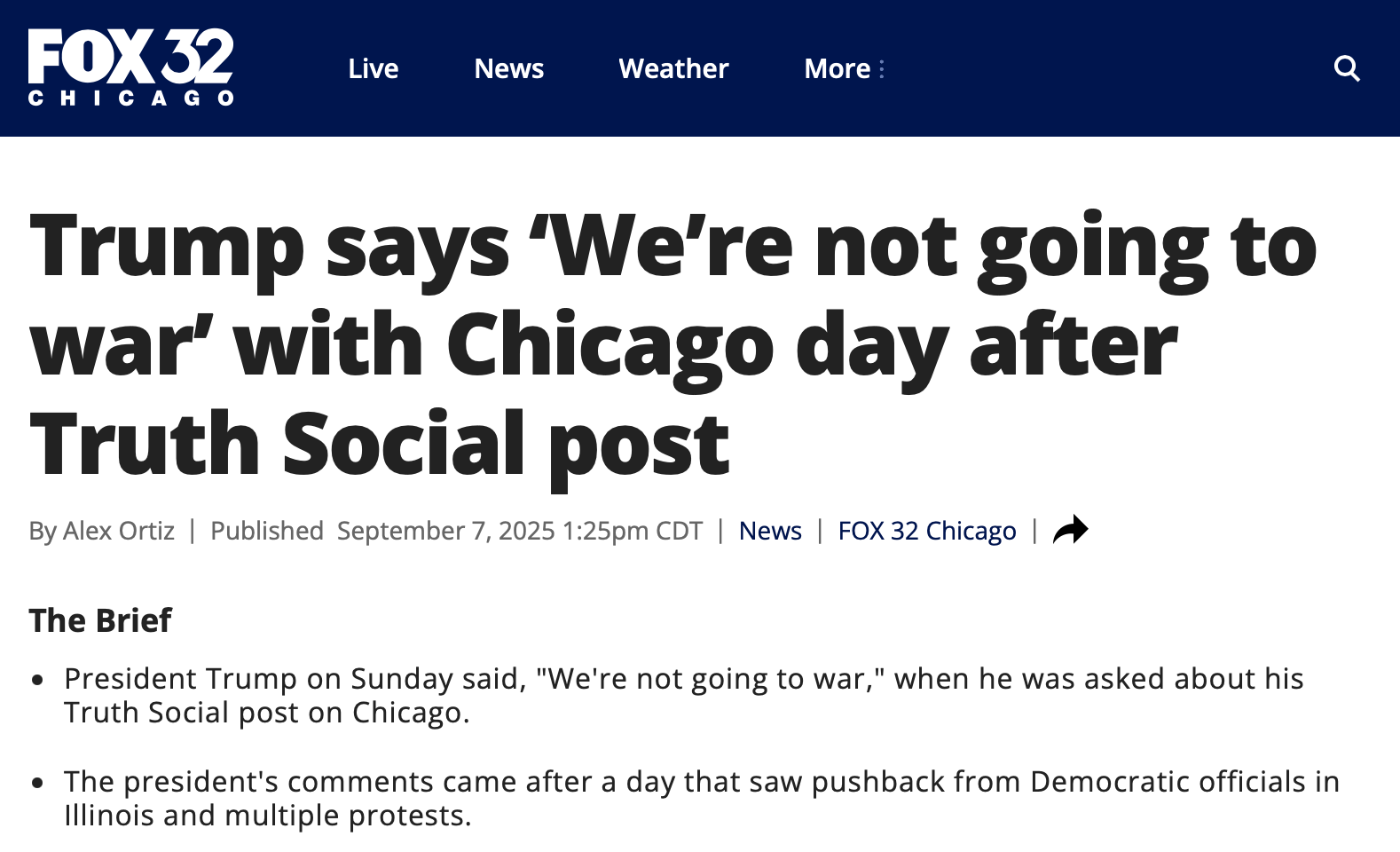Trump declares war on an American city. The news media tries to manufactures consent -- but it isn’t working.
Saturday morning, Donald Trump declared "war" on an American city governed by his political opposition. Referring to the executive order he issued last week giving the Department of Defense an expensive new nickname, the “Department of War,”[1] Trump posted on social media:
You might think the president of the United States saying he is about to go to “WAR” against an American city would be front-page news. Yet today’s print edition of the New York Times doesn’t contain a word about it. Nor does the Washington Post. I know from past experience that knee-jerk defenders of decisions like this will argue that print deadlines make it tough for Saturday news to make it into the Sunday paper, so I will preemptively note that Trump’s social media post about sending the United States military to war in Chicago came on Saturday morning, and that both newspapers' Sunday print editions reported the outcome of a tennis match that concluded Saturday evening. The Times even ran a photo from the match on its front page. These newspapers could have printed Trump’s authoritarian threat in their Sunday editions; they chose not to. Nor does either newspaper’s website give the news prominent treatment at this writing.[2]
The Sunday New York Times front page did contain an article about the Trump regime’s threats to use the U.S. military to occupy cities governed by elected Democrats – but that article portrayed the occupation as “Police Aid” welcomed by “local leaders.” The article’s lede was a multi-paragraph anecdote about a Democratic mayor who in 2020 “worried about how federal law enforcement officers” sent by Trump to his city “would conduct themselves on the ground” but who later “came to endorse parts of the federal mission” and now says he would “say yes in an instant” if “federal agents were sent to help keep guns out of the hands of domestic abusers and teenagers.” The article then quotes another Democratic mayor saying his request of national guard troops from his state’s governor to help fight crime was the “Best request I ever made.”
Downplaying Trump's authoritarian moves while portraying the use of federal troops as a valuable crime-fighting tool: All in all, just another day in the news media's ongoing efforts to manufacture consent for Donald Trump's illegitimate and unpopular use of the United States military to occupy, intimidate, and harass American cities led by democratically-elected members of his political opposition. I wrote about that effort in this space about a week ago.
On Friday, I discussed that piece and related matters on WNYC's "On the Media," broadcast on 400 radio stations around the country and available as a podcast here. It was a great conversation; I hope you'll check it out.
I also discussed the news media's coverage of Trump's military occupation and the debate over how Democrats should respond to it with The New Republic's Greg Sargent. You can listen to that conversation on Greg's podcast; there’s also a transcript available if you prefer.
One of Greg’s questions reminded me of something I forgot to include in my piece: To the extent that Democrats are sometimes seen as weak on issues like crime it is in part because they behave like they are weak:
Sargent: We are actually seeing what happens when Democrats do engage this debate. J.B. Pritzker, the governor of Illinois, as you highlighted in your piece and as a number of other people have highlighted, did this extraordinary response to Trump’s threats to occupy Chicago where he said, “I’m going to defend my people from you.” Cast Trump as the threat. The primary threat to the wellbeing of Illinois residents, Illinois constituents is Donald Trump, the president of the U.S., and J.B. Pritzker, the Democratic governor, will defend them from him. [...]
Foser: [...] To the extent that crime historically has often been a tough issue for Democrats, it’s largely because of the way the media covers it and this perception that Democrats are weak. I don’t think [that] is true substantively on the issue, but I will say that one of the reasons that maybe people think you’re weak is that you act weak more than the policies that you pursue. And so if Donald Trump is invading cities and you’re cowering from it, you look weak. If you stand up in front of cameras for 15 minutes like J.B. Pritzker did and basically say, 'Stay the hell out of my city, you’re not welcome here. And if you hurt my people, I will pursue you until the ends of the earth to hold you accountable,' you look strong because you are strong.
Speaking of strength, here's how Chicago responded on Saturday to Trump's social media threat of war:
[Chicago Mayor Brandon] Johnson, a Democrat, said on social media that Mr. Trump’s latest post was “beneath the honor of our nation, but the reality is that he wants to occupy our city and break our Constitution.”
Gov. JB Pritzker of Illinois, a Democrat, called the post “not normal.”
”The President of the United States is threatening to go to war with an American city,” he said. “Illinois won’t be intimidated by a wannabe dictator.”
Chicagoans came out in force against Mr. Trump in the city’s downtown on Saturday afternoon, as a demonstration drew thousands of people who protested the prospect of increased ICE arrests and the president’s plan to bring the National Guard into the city.
As he stood among the gathering throng, Scott Smith, 50, said he had weighed whether or not to make the trek from his South Side neighborhood of Morgan Park to attend the rally.
“Honestly, what made me realize I needed to be here was when I saw Trump’s social media post this afternoon,” Mr. Smith said. “I was on the fence, and then I saw he was declaring war on an American city, my city.”
And speaking of weakness, here's how Donald Trump reacted on Sunday:
Donald Trump's authoritarian threat is real, but it isn't inevitable. He's hoping his threats and actions are met with weakness. When they aren't, he sometimes shows his own.
You have probably heard or read that Trump has "renamed the Department of Defense" the Department of War, which is how the move has typically been covered. This is false. Donald Trump does not have the authority to unilaterally rename the Department of Defense. He has given it a nickname -- a nickname that reportedly "could cost billions of dollars for a cosmetic change." (The Department of Defense is famously quite large and the costs of printing a dumb new nickname on hundreds of thousands of facilities around the world, including everything from buildings to letterhead to keychains to napkins, add up in a hurry.) You may also have heard that Trump's move restores the department's original name. This widely-reported "fact" mimicks Trump's own claims, but is (of course!) also false. The Department of Defense has never been named the Department of War. The Department of War was just the Army; the Department of Defense was created in 1947 to unify the Army and Navy under one umbrella. ↩︎
The Times ran an online article with a both-sidesy headline ("Tensions Mount") that omitted the word "war" and continued to describe Trump's actions as a "crackdown" on crime. As far as I can tell, the Post hasn't published a single news story of its own about the threat, even online, though its website does contain a repost of an Associated Press artcle. I should note that the leaders of the Washington Post, as part of their ongoing enshittification of their own product, have degraded the Post’s website search functionality, which does not offer sort-by-date or filtering options, making it difficult to say with absolute certainty that Post has not published its own article about the topic. I would however suggest that the distinction between “has not published its own article about the topic” and “has not published an article about the topic that one can readily find by searching the newspaper’s website” is one without a difference, so I don't anticipate losing sleep over the possiblity that I missed an article the Post chose to hide. ↩︎
Thank you for subscribing to Finding Gravity! Please consider upgrading to a paid subscription to support my work.


Member discussion